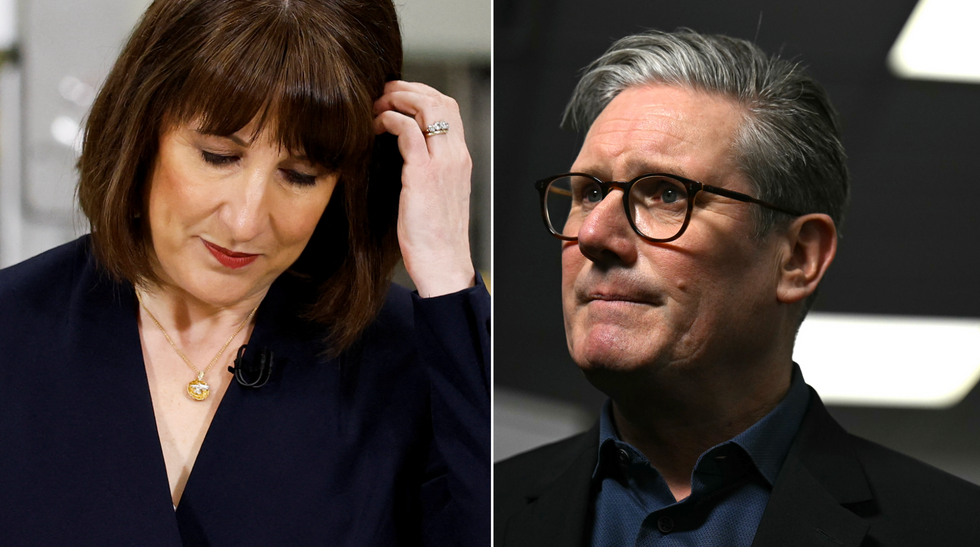Peter Kyle MP defends Rachel Reeves amid a fresh scandal about the …
GB News
Sir Keir Starmer has insisted that Rachel Reeves will carry on as Chancellor "throughout the whole of this parliament", but five mechanisms could force his hand
Don't Miss
Most Read
Trending on GB News
Calls for Rachel Reeves to resign have got louder this week as the Chancellor comes under a fresh wave of scrutiny after a BBC News investigation raised questions about the accuracy of her online CV and the use of expenses while working at a bank.
A spokesperson for Reeves said she was "not aware of an investigation nor was she interviewed, and she did not face any disciplinary action on this or any other matters" and a minister has hit out at allegations about her CV, telling GB News that "she has apologised" and that "someone who works for her did her account on LinkedIn".
Unfortunately, she has far more intractable problems to deal with.
Despite making growth the central plank of her fiscal policy, Reeves may be forced to cut spending or raise taxes further after the Office for Budget Responsibility (OBR) preliminarily downgraded growth forecasts this week, indicating that the Chancellor's fiscal headroom has been significantly reduced.
Meanwhile, her plan to plug the £22billion blackhole left by the last Government by changing inheritance tax rules on farmers and axing winter fuel payments for millions of pensioners has further sank her popularity.
Last month, the Prime Minister resisted calls to replace Reeves as Chancellor, insisting that the pair will work together "throughout the whole of this parliament".
However, this does not mean her position is secure.
Yes, the decision ultimately rests with Starmer, but his hand could be forced by various political, party, and public mechanisms.
Here are the five ways Reeves could be forced to resign:
Cabinet shuffles
Prime Ministers often use cabinet reshuffles to remove or replace ministers without explicitly firing them.
For example, Gordon Brown reshuffled his cabinet multiple times in a bid to relaunch his premiership, leading to voluntary resignations from ministers.
Boris Johnson was also fond of this mechanism, making several cabinet reshuffles that led to ministers either being dismissed or resigning.
If Starmer senses that Reeves' policies are leading the party to an electoral defeat, he may attempt a cabinet reset.

Sir Keir Starmer has insisted that Rachel Reeves will carry on as Chancellor but pressure could force him to reverse course via five mechanisms
Getty Images
Personal spat with the Prime Minister
Keir Starmer's support may seem ironclad, but a lot can change over the course of government.
If the PM loses confidence in Rachel Reeves, he could either request her resignation or formally dismiss her.
Party politics can strain the relationship. The most recent example is Sajid Javid, who resigned as Chancellor in 2020 after a dispute with then-Prime Minister Boris Johnson regarding the independence of his advisors.
Fundamental disagreement over government policy can also take a hammer to the relationship.
Chancellor Nigel Lawson resigned in 1989 after policy disagreements with Prime Minister Margaret Thatcher regarding economic strategy.
Public scandal or controversy
In British politics, optics is everything, so public scandals can force a Chancellor to resign if a media circus gathers steam.
Although not a personal scandal per se, Norman Lamont’s position became untenable after his handling of "Black Wednesday" in 1992.
On this day, the pound crashed out of the European Exchange Rate Mechanism (ERM), costing the UK billions and severely damaging the government’s credibility.
Public and political pressure mounted after the economic fallout, leading to the Conservative politician's dismissal in 1993. While this was not driven by personal misconduct, public outrage at his handling of the economy forced him out.
Reeves will be mindful of this as she attempts to restore confidence in her Chancellorship against an increasingly difficult economic backdrop.
Party pressure and internal revolts
The Labour Party has internal processes for applying pressure on ministers. If enough MPs or key Labour groups openly criticise the Chancellor, it could destabilise her position.
Starmer will also be acutely aware of the fact that internal divisions brought down the last Government.
If a rebellion builds around Reeves, it could force his hand.
The most infamous example of Charles Clarke, who was Home Secretary under then-Prime Minister Tony Blair.
He was forced to resign after admitting the Home Office freed 1,023 foreign prisoners who should have been considered for deportation.
There was significant pressure from within the Labour Party, which was also facing electoral losses, for him to step down due to these blunders.
LATEST MEMBERSHIP DEVELOPMENTS
Vote of no confidence
Although there is no formal, codified procedure for a vote of no confidence in an individual minister, one can be brought against the Prime Minister over his decisions.
This scenario could play out if his refusal to sack Rachel Reeves becomes at odds with public feeling and he faces a rebellion from MPs.
Starmer will be forced to choose party unity over defeat at the ballot box.








